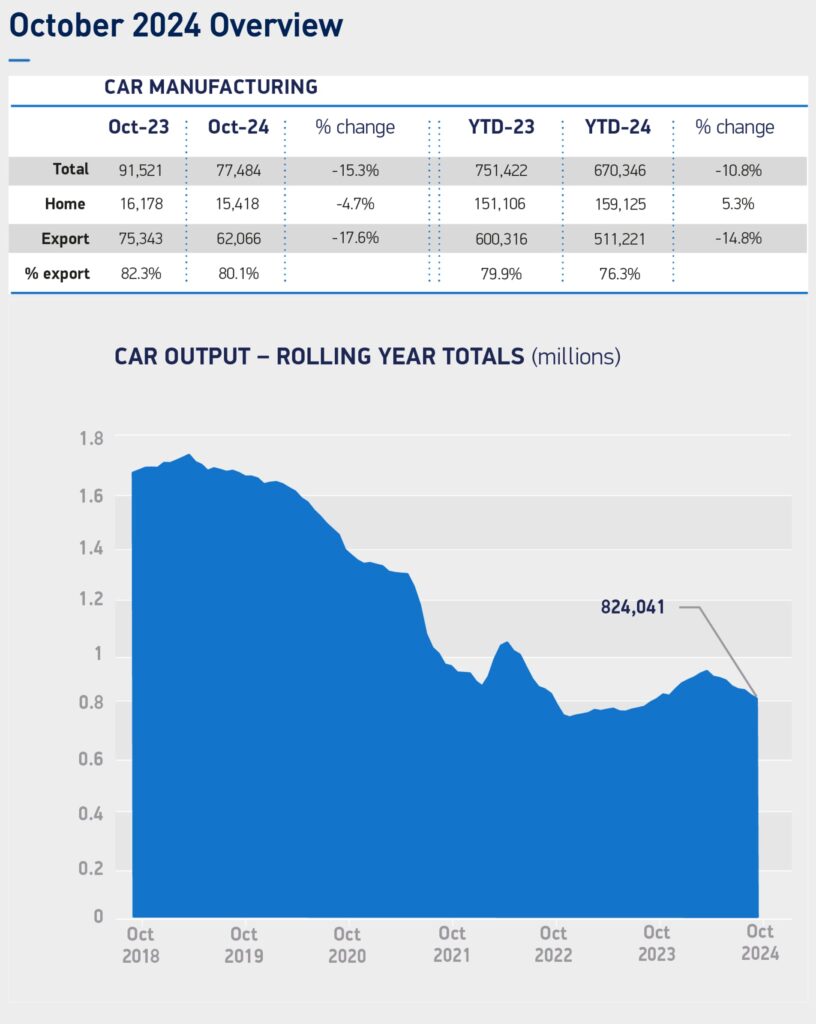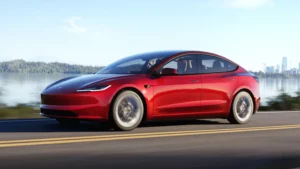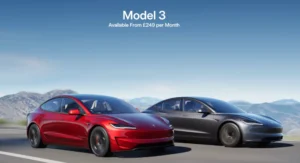UK car manufacturing output fell -15.3% in October, the eighth consecutive month of decline, according to the latest figures published today by the Society of Motor Manufacturers and Traders (SMMT). 77,484 units left factory gates, 14,037 fewer than in the same month last year, with plants continuing their retooling to enable production of the next generation of zero emission vehicles.
24,719 battery electric, plug-in hybrid and hybrid electric cars were made, representing almost a third (31.9%) of output, despite a volume decline of -32.6%. Since January, UK car makers have now turned out a combined 239,773 electrified vehicles, with 71.8% of them exported to global markets.
Overall, volumes for both domestic and export markets declined in October, down -4.7% and -17.6% respectively, with eight-in-10 cars shipped abroad and more than half of these (32,170 units) heading into the EU, although total volumes fell by -34.6%. Exports to the next largest market, the US, meanwhile, surged 96.2% to 14,584 units, thanks to increasing shipments of the UK’s luxury and premium models.
In the year to date, UK car production has now slipped -10.8% to 670,346 units, due primarily to falling exports. While production for the UK is up 5.3% to 159,125 units, exports are down -14.8% to 511,221 units, equivalent to 89,095 fewer cars being shipped overseas in the first ten months.

The news follows a series of announcements by manufacturers and suppliers, in the UK and Europe, reflecting challenging market conditions and a slowdown in the transition to electrification. Ensuring the UK remains a globally competitive location for advanced vehicle manufacturing, therefore, requires an industrial and trade strategy that works for the sector and, in addition, a healthy domestic market, given car makers build close to where they sell. Government must work in partnership with industry to deliver market regulations that support consumers and industry, including measures to address the UK’s high cost of energy and the signing of trade deals built on free and fair trade.
So far there is little evidence of the Government taking any notice – Only this week we have news that Stellantis will be closing its Luton van plant with the loss of over 1,000 jobs.
Stellantis, which also owns brands including Citroen, Peugeot and Fiat, said it would combine its electric van production at its other UK plant in Ellesmere Port in Cheshire.
Rules imposed to speed up the transition to electric vehicles (EV) in the UK partly drove the decision, the firm said.
Union Unite said the move was a “complete slap in the face” for its members working in Luton.
As part of the shift to electric, manufacturers are currently required to sell a certain percentage of cars and vans that do not emit any emissions ahead of the 2030 ban, with quotas increasing each year.
Current rules state EVs must make up 22% of a carmaker’s car sales, and 10% of van sales in 2024.
For every sale that pushes it outside the mandate, firms must pay a £15,000 fine. There are flexibilities in the system, allowing manufacturers who cannot meet the targets to buy “credits” from those that can.
And news that German machine and car parts maker Schaeffler said it will close two production facilities, in Austria and Britain, as a part of restructuring measures.
Sources: Autocar, BBC and SSMT.





